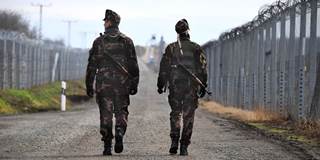In 2018, many of the world’s major economies faced profound political recalibrations. To improve stability in 2019, leaders will need to focus on bread-and-butter domestic concerns, while moving toward more flexible and decentralized political models capable of governing diverse populations.
STANFORD – For many of the world’s economies, financial markets, heads of government, and carbon policies, 2018 did not end well. The scars of the global financial crisis and Great Recession, combined with longer-term structural economic, technological, cultural, and demographic trends, have left large swaths of the population in many countries feeling politically neglected, culturally disparaged, and/or economically wounded. And their expression oftheir grievances – at the polls, on the Internet, and in the streets – has left their leaders profoundly weakened.
In Germany, four-term Chancellor Angela Merkel has long acted as the European Union’s de facto leader. Then came her fateful 2015 decision to welcome more than one million refugees into Germany. The backlash – fueled by frustration with the added pressure on public services, finances, and law enforcement, not to mention political fearmongering – left Merkel so wounded that she did not seek reelection as leader of her party this month, and will not stand for reelection as chancellor after her current term expires in 2021.
Anti-immigrant sentiment is hardly confined to Germany. From Italy to Poland, it has helped populist political parties win power. Hungary erected barbed-wire fences to keep out refugees. Denmark confiscated immigrants’ assets and is now set to send hundreds of “unwanted” asylum-seekers to a remote, uninhabited island once used for research on diseased animals.

STANFORD – For many of the world’s economies, financial markets, heads of government, and carbon policies, 2018 did not end well. The scars of the global financial crisis and Great Recession, combined with longer-term structural economic, technological, cultural, and demographic trends, have left large swaths of the population in many countries feeling politically neglected, culturally disparaged, and/or economically wounded. And their expression oftheir grievances – at the polls, on the Internet, and in the streets – has left their leaders profoundly weakened.
In Germany, four-term Chancellor Angela Merkel has long acted as the European Union’s de facto leader. Then came her fateful 2015 decision to welcome more than one million refugees into Germany. The backlash – fueled by frustration with the added pressure on public services, finances, and law enforcement, not to mention political fearmongering – left Merkel so wounded that she did not seek reelection as leader of her party this month, and will not stand for reelection as chancellor after her current term expires in 2021.
Anti-immigrant sentiment is hardly confined to Germany. From Italy to Poland, it has helped populist political parties win power. Hungary erected barbed-wire fences to keep out refugees. Denmark confiscated immigrants’ assets and is now set to send hundreds of “unwanted” asylum-seekers to a remote, uninhabited island once used for research on diseased animals.